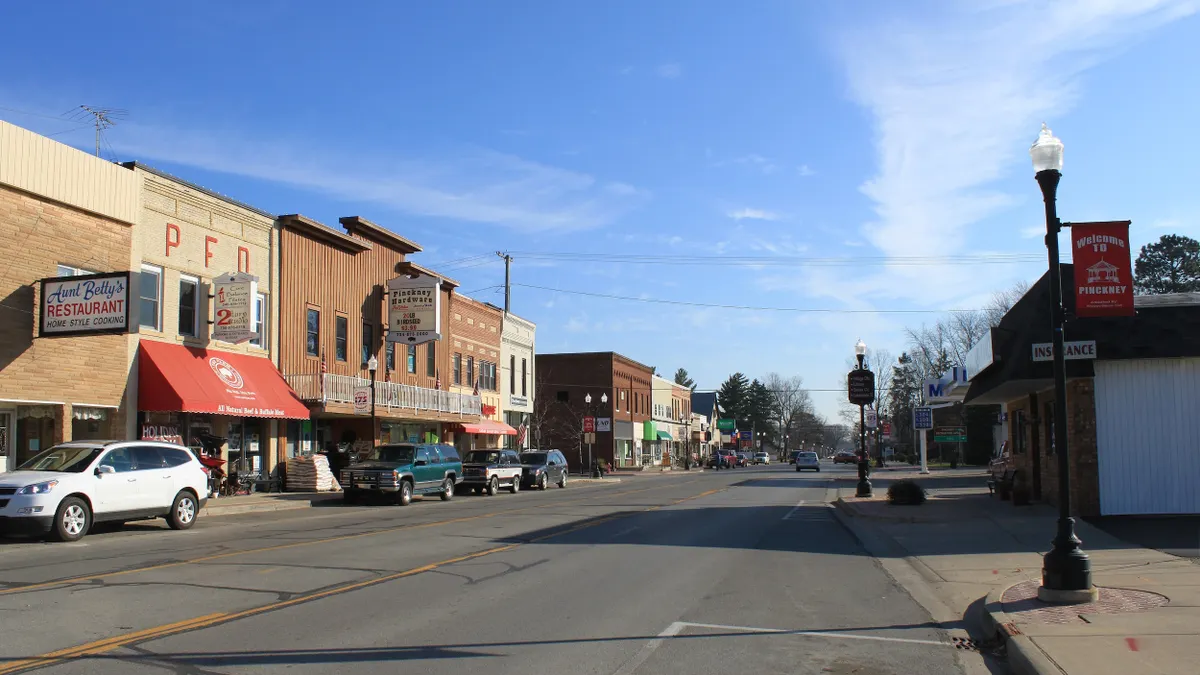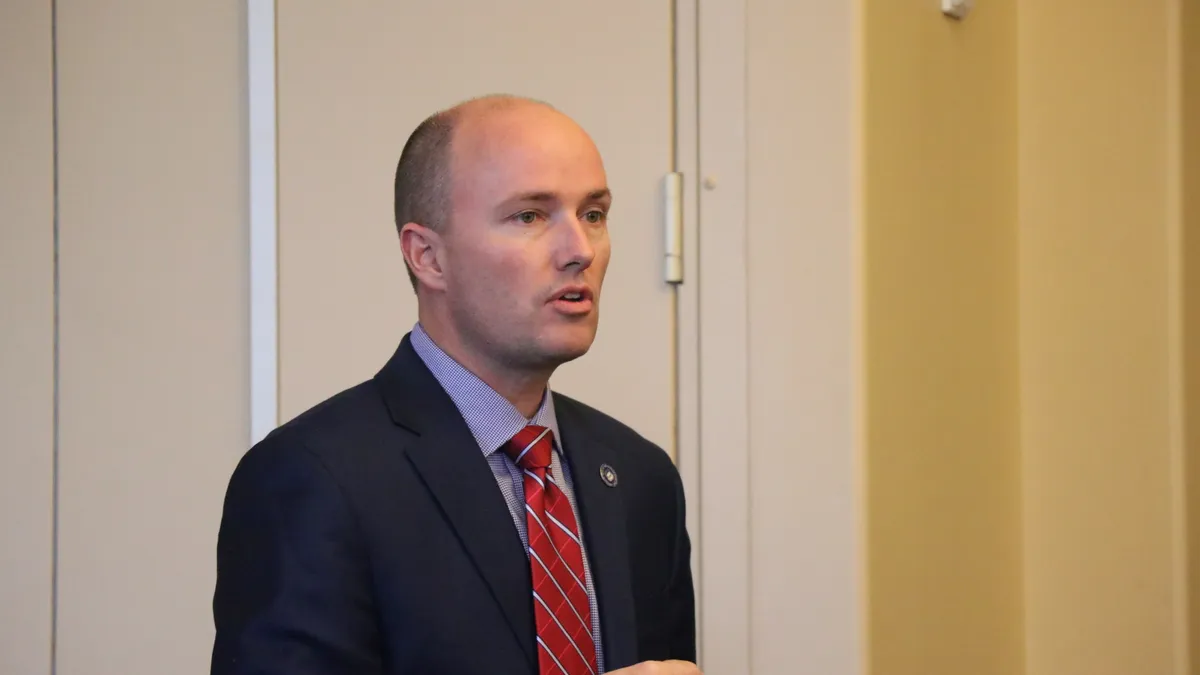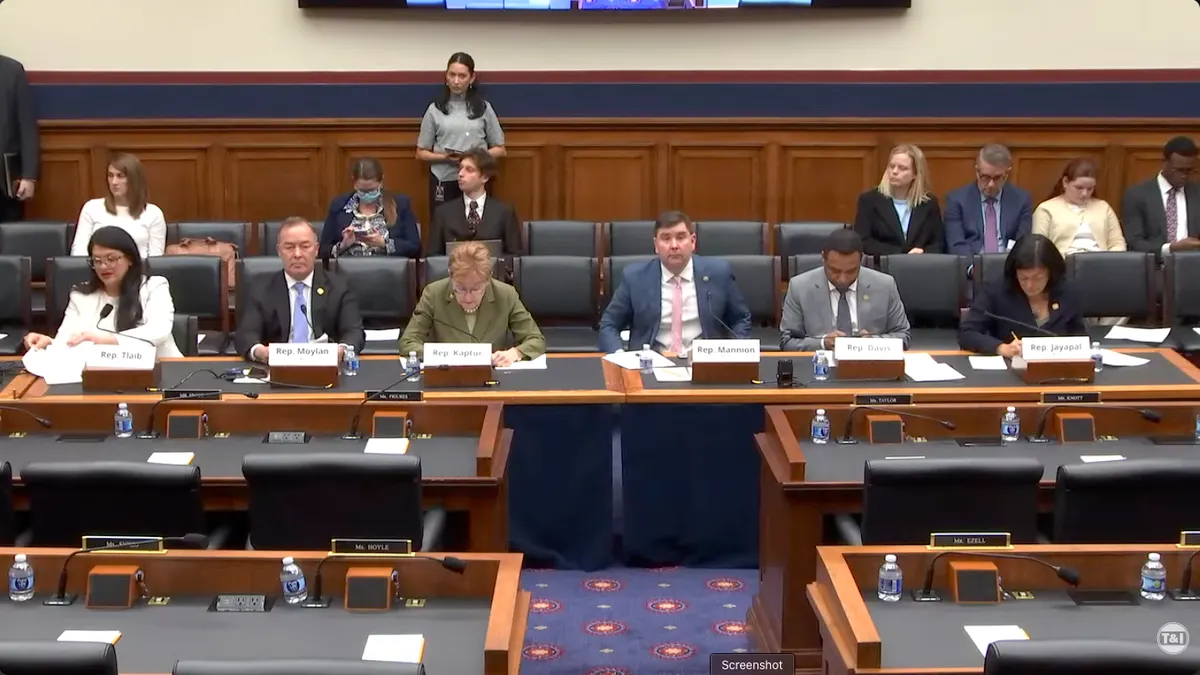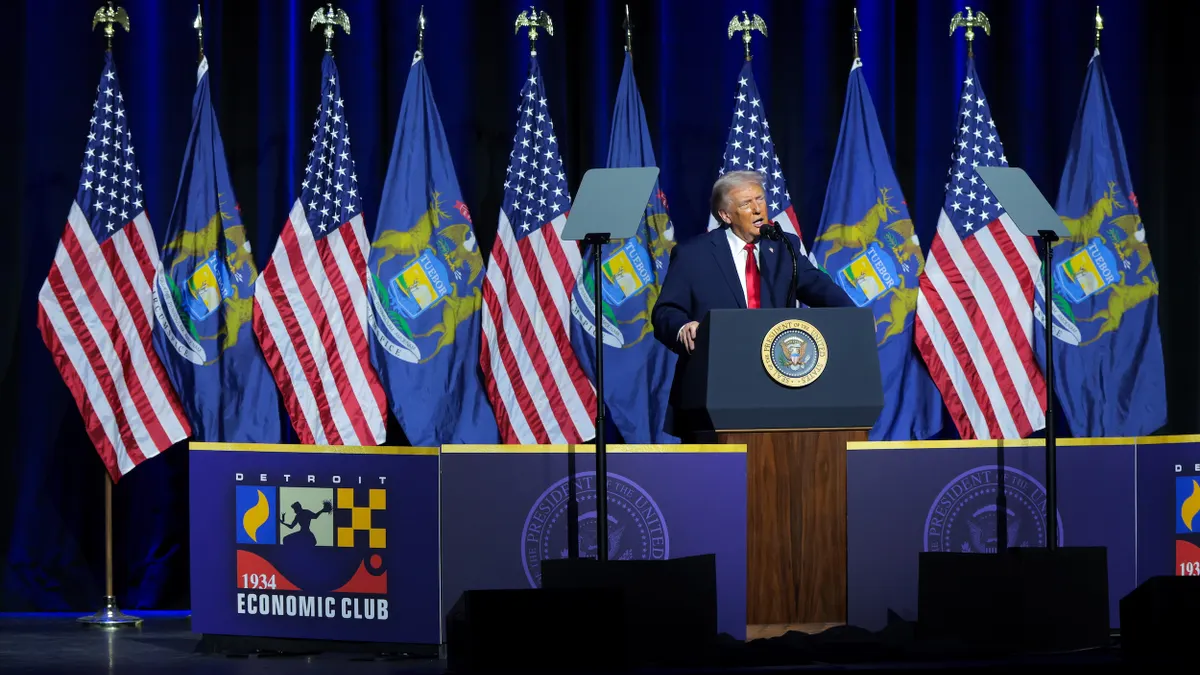As Los Angeles anticipates heightened tourism from the 2026 FIFA World Cup and 2028 Summer Olympics, a debate has been raging over how the city’s hourly workers in the travel and hospitality industries should be compensated.
Worker organizations, including hospitality union Unite Here Local 11, have been advocating for a citywide ordinance that would raise hospitality workers’ minimum wage to $30 by July 1, 2028, to accommodate rising costs of living as city hotels and airports serve an influx of tourists.
Though industry associations, including the American Hotel & Lodging Association, opposed it — claiming a higher wage could be disastrous for hotel owners and operators in the city — Mayor Karen Bass signed the Citywide Hotel Worker Minimum Wage Ordinance, sometimes called the Olympic Wage, into law May 27.
But the fight didn’t end there. Following the law’s passage, an association of hospitality and tourism industry players claims to have collected enough signatures to file a referendum against the ordinance, temporarily suspending its July 1 enforcement. Meanwhile, proponents of increasing the minimum wage have continued to launch efforts pushing back.
An ‘economic tsunami’
The Citywide Hotel Worker Minimum Wage Ordinance mandates set wage increases for tourism and hospitality workers in Los Angeles annually through July 1, 2029, and outlines parameters for determining annual raises in the years after.
“Hotel workers often live paycheck to paycheck and are frequently forced to work two or three jobs to provide food and shelter for their families,” reads the ordinance. “In many instances, they cannot take time to spend with their children or care for themselves or family when sick. They also rely on the public sector as a provider of social support services and, therefore, the City has an interest in promoting an employment environment that protects government resources.”
Per the ordinance, No. 188610, the minimum hourly wage for a hotel worker at properties with more than 60 rooms will be $25 in July 2026, $27.50 in July 2027 and $30 in July 2028. Hotel employers are also required to pay an additional minimum toward health benefits.
After the Los Angeles City Council approved the ordinance on May 14, hotel and travel organizations were quick to voice their dissent, with AHLA President and CEO Rosanna Maietta warning the bill’s effects would cause an “economic tsunami” in an open letter dated May 20.
In the following days, the LA Alliance for Tourism, Jobs and Progress — which is sponsored by hotel companies, airlines and trade associations such as AHLA and other businesses impacted by the ordinance — launched a petition campaign to collect signatures for a referendum on the ordinance.
“We were compelled to take a stand and join the tourism and business community in Los Angeles,” Maietta said of the effort to collect the 93,000 signatures required to qualify for a referendum on the ordinance that would be on the June 2026 ballot.
“This referendum is about fighting for the survival of our industry in one of the major destinations in the country.”
As the referendum petition began to circulate, Unite Here Local 11 contested the validity of signatures collected by the alliance. In a complaint filed to California Attorney General Rob Bonta on June 11, the union alleged that signature gatherers had shared “egregious misrepresentations of the content and effect of the referendum petition.” The union further alleged that signature gatherers perpetrated violence via physical intimidation and, in one case, by assaulting members of the public.
The following week, a number of California elected officials signed an open letter to the CEOs of Hilton, United Airlines, Delta Air Lines, Hyatt Hotels, Marriott International and AHLA saying they were “deeply concerned” by Unite Here’s complaint.
“[Perhaps] most egregiously, the Complaint alleges that Referendum circulators have repeatedly misrepresented to voters that they are signing a referendum to increase the minimum wage—the very opposite of what the Referendum would do,” the letter reads. “This is an astounding—and highly flawed—attempt to interfere with a deeply local concern of Los Angeles, and we demand that [petition gatherers] cease immediately.”
Undeterred, on June 27, the LA Alliance for Tourism, Jobs and Progress submitted more than 140,000 signatures from Los Angeles voters, far in excess of the 93,000 required for the referendum to be included on the June ballot.
On July 23, the city clerk confirmed that the petition had enough signatures to move forward to the Los Angeles county registrar-recorder/county clerk, where they will be checked for validity.
The fight over the Olympic Wage
-
May 14, 2025Los Angeles City Council approves the Citywide Hotel Worker Minimum Wage Ordinance.
-
May 20, 2025American Hotel & Lodging Association CEO Rosanna Maietta writes an open letter to Mayor Karen Bass asking her to veto the ordinance, warning it will cause an “economic tsunami.”
-
May 27, 2025Mayor Karen Bass signs the Citywide Hotel Worker Minimum Wage Ordinance into law.
-
Early June 2025The LA Alliance for Tourism, Jobs and Progress launches a petition campaign to fight the ordinance and begins gathering signatures.
-
June 11, 2025Unite Here files a complaint with the California attorney general alleging LA Alliance petition gatherers misrepresented the ordinance and, in some cases, violently intimidated signees.
-
June 27, 2025The LA Alliance for Tourism, Jobs and Progress submits more than 140,000 signatures from Los Angeles voters, exceeding the 93,000 required for the referendum, suspending the ordinance’s enforcement.
-
July 23, 2025Los Angeles’ city clerk confirms that the petition has enough signatures to move forward to the Los Angeles county registrar-recorder/county clerk for verification.
In the meantime, the LA Alliance for Tourism, Jobs and Progress is “anticipating that [the number of collected signatures] will certainly be enough,” Laura Lee Blake, president and CEO of the Asian American Hotel Owners Association, told Hotel Dive. Since submitting the signatures, enforcement of the ordinance, which was initially set to take effect July 1, is on pause.
Workers’ plight
The wage fight comes at a crucial time for Los Angeles’ hotel industry.
Next year’s World Cup is projected to generate approximately $594 million for Los Angeles “while creating jobs all across the region and boosting tourism,” California Gov. Gavin Newsom said in a statement as part of a 2024 report on the event’s economic impact.
“We won this, and it's not fair that these companies are now just trying to take it [away]."

Maria Rubio
union worker at Flying Food Group
Meanwhile, California State Sen. Ben Allen, who chairs the State Senate’s Special Committee on International Sporting Events, said the 2028 Olympics could generate up to $18 billion in economic output, $700 million in state and local tax revenues and nearly 100,000 jobs, the Santa Monica Mirror reported.
Unite Here Local 11 — which represents more than 32,000 workers at hotels, restaurants, airports, sports arenas and convention centers across Southern California and Arizona — believes workers should benefit from the influx of tourists that they’re serving.
One such worker is Maria Rubio, a union worker at Flying Food Group, which prepares airline meals out of Los Angeles International Airport. Rubio was part of a group of workers who regularly testified at Los Angeles City Council meetings about their need for a higher wage, she said.
After the council approved the wage hike — which, before it was suspended, would have bumped her wages to $22.50 per hour on July 1 — Rubio said the increase still would not be enough to cover a recent $300 rent hike, and she is considering moving out of the state.
According to MIT’s Living Wage Calculator, a living wage in Los Angeles County for one adult with no children is $27.81. That wage is lower for child-free households in which both adults are working ($18.83), but usually higher for homes with children: from $26.71 to $58.51, depending on the number of children and working adults.
Regardless of whether she stays in California, “it's frustrating because we were counting on that money right on July 1,” Rubio said, noting that she sends money back to family in Honduras. “We won this, and it's not fair that these companies are now just trying to take it [away].”
Unite Here Local 11 — alongside local partners in the Service Employees International Union and the Los Angeles Alliance for a New Economy — continues to push back against the LA Alliance for Tourism, Jobs and Progress through its “Defend the Wage” effort, which on June 27 mounted a campaign asking the Los Angeles city clerk to invalidate the alliance’s referendum petition.
Business challenges
Representatives of AHLA and AAHOA have said that raising the minimum wage could hurt hotel workers if higher labor costs cause hotels to cut jobs or shut down.
For instance, AHLA estimates the ordinance could result in the elimination of “at least 15,000 jobs and the loss of hundreds of millions in critical tax revenue the city depends on,” Maietta said.
“As a small business owner, [the wage hike] is tough. Already, [owners] are facing increased costs due to inflation. Their insurance rates have skyrocketed. Their labor costs are rising."

Laura Lee Blake
president and CEO, Asian American Hotel Owners Association
Owners also worry about their ability to stay in business, according to Blake, who noted that AAHOA represents owners of more than 1,000 hotels in Los Angeles.
“As a small business owner, [the wage hike] is tough,” Blake said. “Already, [owners] are facing increased costs due to inflation. Their insurance rates have skyrocketed. Their labor costs are rising. … What does that mean for the owners? Either they have to close their doors, or they have no choice but to somehow pass [costs] on to the traveling public.”
The ordinance is “likely to compress wage scales, particularly affecting supervisory and mid-level positions,” Lara Shortz, Los Angeles office managing partner at Michelman & Robinson, said. “This compression could lead to staffing restructures and challenges in talent retention, even at higher levels.”
Los Angeles businesses have already faced their share of challenges in recent months and years.
“Los Angeles is a top tourism destination that has struggled to bounce back from the pandemic,” Maietta said. “With travel demand further decreasing this year and other challenges like the wildfires, the tourism industry needs the city’s support.”
California Hotel & Lodging Association CEO Lynn Mohrfeld told Hotel Dive earlier this year that Los Angeles hotels’ costs have risen faster than revenues since the pandemic.
“Labor costs are one of the things that hotel operators and owners are really trying to manage, [while] being as true to our employees as we possibly can, but realizing the business realities of it too,” he said in March.
Meanwhile, insurance costs in California have risen faster than they have elsewhere in the country. In 2023, hotel insurance costs in the state rose 28.1% year over year, a higher growth rate than the national average of 19%, according to CBRE data obtained by Hotel Dive in March.
Changes ahead
As the Citywide Hotel Worker Minimum Wage Ordinance remains in limbo, hoteliers should still prepare for changes, Shortz said.
“Operators need to prepare now — by reviewing staffing budgets, evaluating HR and training systems and reassessing contracts with [the Olympic Games] and others — to stay ahead of the curve,” she said.
Shortz also noted that the city of Los Angeles has committed to producing formal impact reports about the ordinance at six-month and one-year intervals. These reports, which rely on data from hotels showing the ordinance’s impact on finances and operations, could influence possible revisions or delays to the ordinance or its implementation.
“Hoteliers should begin collecting that evidence now to meaningfully shape policy outcomes,” Shortz advised.
Blake noted that AAHOA is also watching for wage hikes elsewhere — particularly within California.
“Usually, if something happens in LA, we will start seeing it spread across the country,” she said.
That could soon be San Diego, for instance, where a proposal for a $25 minimum wage for tourism workers advanced within the city council on June 25, local station NBC 7 reported.
Blake also pointed to the California cities of Long Beach and Anaheim as sites of recent wage battles. Long Beach enacted a $25 minimum wage for hotel workers as of July 1. An ordinance that would have mandated the same wage in Anaheim, however, failed to pass.
Blake said she anticipates similar measures to appear in other California cities. The ongoing battle in LA, however, “took it to a whole new level.”




















